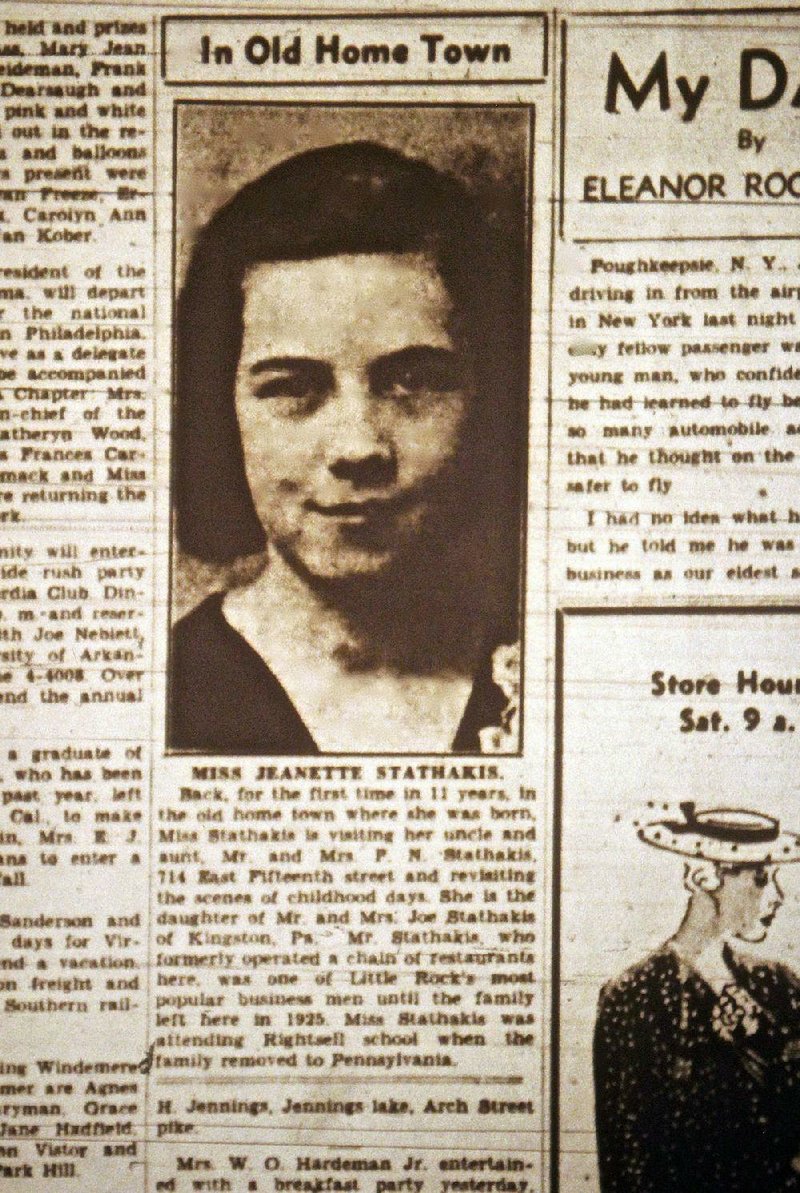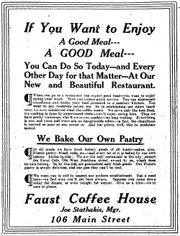A young woman named Jeanette Stathakis came to Little Rock briefly in 1936, and the Arkansas Gazette thought everyone should know.
Back, for the first time in 11 years, in the old home town where she was born, Miss Stathakis is visiting her uncle and aunt, Mr. and Mrs. P.N. Stathakis, 714 East Fifteenth street and revisiting the scenes of childhood days.
Pete Stathakis was a well known restaurateur, but I think Jeanette's face was society news because of this:
She is the daughter of Mr. and Mrs. Joe Stathakis of Kingston, Pa. Mr. Stathakis, who formerly operated a chain of restaurants here, was one of Little Rock's most popular business men until the family left here in 1925. Miss Stathakis was attending Rightsell school when the family removed to Pennsylvania.
Joe Stathakis was memorable.
He came to Arkansas with his brothers around the turn of the 20th century. These unmarried young men had left Gythion, a village in southern Greece, where options were limited, to make their fortunes in the United States. They did not intend to stay here, but, as it turned out, they were too American to leave.
Joe and Pete aren't Greek names. The bureaucrats at New York's Ellis Island were notorious for revising immigrants' names; but Joe and Pete entered this country by way of Canada. So we can imagine that the Stathakis brothers chose -- or chose to accept -- their own American names.
In 1985, Bill Stathakis, one of Pete's nine children, described for Arkansas Democrat reporter Tom Kazas how his father and Joe worked their way from Chicago to Arkansas, with a stopover in Kansas City, where they laid track and slept in miserable gang housing.
"Immigrants were mistreated," Stathakis said. As one other Greek man put it: "Because they couldn't speak the language, they were given jobs most people didn't want to do. And the pay was not honorable."
In Little Rock, the brothers pulled together, selling fruit from carts and then chili from lunch stands.
They learned English -- some, like Joe, could read and write it. The language barrier was real, and some jerks tried to prey on them, but these guys were not victims.
The Gazette's first mention of Joe appeared in April 1906:
JOSEPH STATH-AKIS PLEADED GUILTY -- In justice court yesterday Joseph Stathakis entered a plea of guilty to the charge of malicious mischief preferred against him by Mrs. Margaret St. John. It appears that Stathakis rents from the Forest Park Amusement Company the candy and fruit stand concessions in Forest park, paying a good sum for the privileges. Mrs. St. John recently secured from H.F. Auten permission to erect and maintain a candy and fruit stand opposite the entrance to Forest Park just across the street car tracks. This property is outside of the park grounds and yet located at a point where the public arrives and departs on the street cars. Considering the stand an infringement on his rights, Mr. Stathakis removed it, he claims, without understanding the woman had authority from the owner of the property to maintain it. Justice of the Peace Parsel assessed a fine of $5 and costs of $16.75, which were paid.
Food service is easy to get into, hard to keep going. The Stathakis brothers switched to dairy farming. That didn't work out. But Joe had saved enough to open a chili and sandwich shop on Capitol Avenue between Main and Louisiana streets.
In January 1910, the Gazette reported:
About 100 Greek residents of Little Rock have formed an organization which they call the Homer Society, the purpose of which is to study economical and social problems of American life and to give what aid they can to the poor in the city. The society organized Sunday night in a hall at 816 Main street, with Charles Kumpuris, president; Nick Kostakis, vice president; Joe Stathakis, secretary, and George Pannos, treasurer. There are about 20 Greek families in Little Rock, according to Mr. Kumpuris, with probably 150 members.
From 1909 to 1922, Joe showed up in at least 100 items in the Arkansas Gazette and 65 in the Arkansas Democrat, including ads he placed for his (increasingly successful) restaurants. A few headlines:
Stathakis Talks of Late King George
Joe Stathakis Returns
Joe Stathakis to Wed
Warm Reception to Joe Stathakis and Bride
Joe Stathakis Honored
Persistency Has Won for Joe Stathakis
Joe Stathakis to Open a Big New Lunch Room
He was described as chubby, ever-smiling and a good scout, and more than one or two stories tagged him as the city's most popular businessman. I've been wondering how the image of genial Joe got going. Such phrases perpetuate themselves in a newsroom, because reporters use earlier editions as sources. But maybe everybody just liked Joe.
In May 1911, this item appeared:
Joe Stathakis, president of the Homer Society, an organization of Little Rock Greeks, says that the proprietor of the Big Battle restaurant, who was arrested on Friday, is not a Greek, as has been published. Mr. Stathakis says that every restaurant keeper who gets in trouble is immediately declared to be a Greek, and that the public in consequence gets an erroneous impression of the race.
The arrested man was named Joe Badorroco. That, and another incident reported by the Gazette in July the same year, suggest how Joe's charisma might have operated:
On Frazier Pike in Little Rock, 15 men and boys robbed Maurice Schneider and Joe Kaston (or Kastin) of 30 dozen bananas and a box of oranges. The Gazette described Schneider and Kaston as "Greek fruit peddlers." Schneider? Greek?
Worse, the reporter indulged in a bogus bit of dialect, and perhaps fantasy, about what the victims told police: "Blacka da man getta da banan."
The next day, this item appeared.
SAYS MEN ARE NOT GREEKS -- Joe Stathakis, president of the Homer Society, a local Greek organization, takes exception to the statement that Maurice Schneider and Joe Kastin, the banana peddlers ... are Greeks. Mr. Stathakis says that there are no Greek banana peddlers in Little Rock.
Surely the point wasn't that Joe and his brother Pete never had sold bananas from street carts. From Kazas' story we know that Pete refused to eat them because years before, in Chicago, he went a whole day without selling even one banana and was afraid his cartload was going to rot.
So he sat on the curb and ate them until he got sick. He never ate bananas again.
It's more likely Joe was offended by the mockery, the portrayal of the peddlers as Greek -- and ignorant.
Now imagine that you are the reporter on the receiving end of a polite but pointed objection from the genial owner of a cafe downtown where you eat a lot of chili and sandwiches. It would make an impression. You would remember to respect that guy.
Next week: Joe Stathakis Must "Set 'Em Up"
ActiveStyle on 09/11/2017


